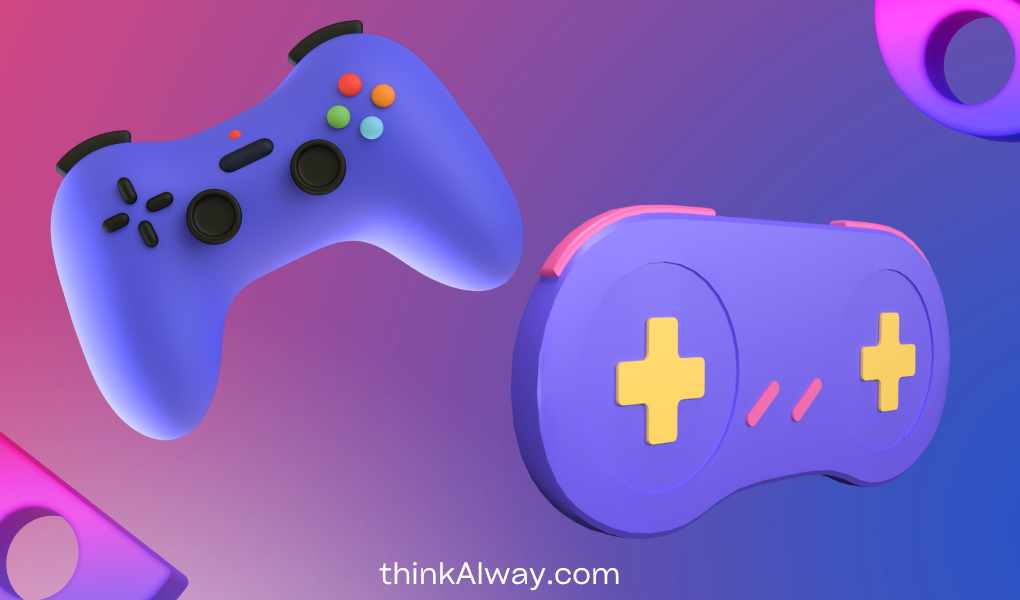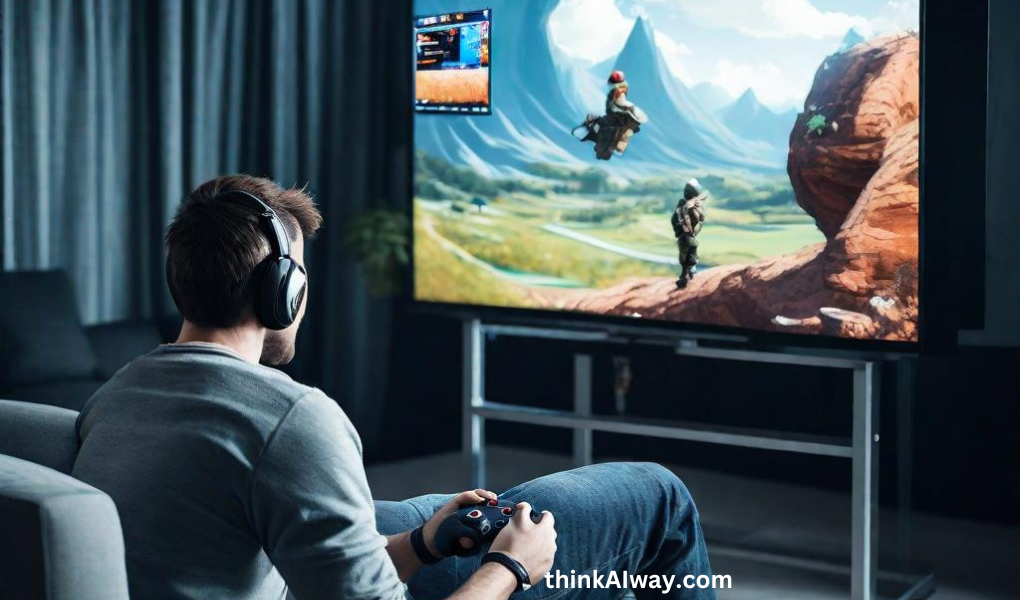In today’s time of the internet, the gaming industry has become a major part of the entertainment world. It connects with people all around the globe who have various interests. People connect online, make friends, and enjoy playing games together.

The gaming industry is a fast-changing and lively business that involves making, improving, promoting, and sharing video games on different devices. The gaming industry is growing a lot because technology keeps getting better. Using AI in the gaming industry has one main goal to make the game feel real for players when they compete against each other in a virtual world. Also, AI in gaming helps keep players interested and happy for a long time.
roles of AI in the gaming industry
The old days have gone by when games were just about passing time. Nowadays, AI has completely changed the gaming industry. AI techniques and algorithms are developing, allowing game developers to showcase their full potential.

Here are some key points that AI has changed in the gaming industry.
Increase Creativity:
AI can make the game’s storyline flexible and able to go in different directions depending on what a player decides to do. This makes the game more interesting to play multiple times because each time you choose something different, the story unfolds in a new way. It also means the game can tell more complex and personalized stories, encouraging creative and imaginative storytelling.
In video games, there are characters controlled by the computer called non-player characters (NPCs). With the help of artificial intelligence (AI), these characters can now act in really smart ways and make decisions on their own. This means that when you play the game, these characters can react to what you do, making the game feel more real and exciting.
AI can propose fresh thoughts, create initial drawings, and help in thinking up ideas. When people work together with AI, it often leads to discovering new and creative game concepts and tools to help game creators with different parts of designing games, like taking pictures and finding mistakes. This means developers can spend more time being creative, coming up with stories, and creating exciting game features
Enhance gaming interactions:
AI algorithms are like smart tools that can make different parts of video games, like levels, maps, and challenges, on their own. This is helpful because it saves time for the people making the games. Plus, it makes the game world more diverse and bigger. When the game content is made in this way, each time you play the game, it’s a bit different. This makes playing the game feel new and fun every time.
AI can make the gaming industry look and feel more like the real world. It does this by making the characters and things in the game behave in a way that seems natural. For example, if you’re playing a game set in a city, AI can make the people in the game walk around, talk to each other, and react to different situations just like real people would. This makes the game world seem more alive and adds to the overall experience of playing the game.
Increase gaming performance:
AI in the gaming industry enhances performance by optimizing loading times, graphics, difficulty levels, resource management, NPC behaviors, and dynamic environments, and implementing anti-cheat measures. This results in a more enjoyable and seamless gaming experience for players.
AI can figure out and remember the different things you might need in a game, such as characters, backgrounds, or textures. By doing this, the game can load these assets in advance. Because the AI is doing this thinking ahead, the game can get ready and load (prepare) these things before you need them.
This reduces the time players have to wait for the game to start or transition between scenes. As a result, you won’t have to wait as long for the game to begin or move from one part to another because everything it needs is already loaded and ready to go. It makes the whole gaming experience smoother and faster for you.
AI can check how powerful a player’s computer or game console is. Then, while the game is being played, the AI can change the way the game looks to make it beautiful, all while making sure the game runs smoothly without any delays or slowdowns on the player’s device. So, players can enjoy a great-looking game without it causing their computer or console to slow down or lag.
AI is good at organizing a computer’s resources like its brain and memory. It makes sure that the computer uses these resources in the best way possible, so when you’re playing a game, it works smoothly without any problems like the game suddenly stopping or slowing down. The AI helps the computer run the game without putting too much pressure on its parts, so everything stays stable and enjoyable.
Future trends in the gaming industry
In the future, the gaming industry is going to use more advanced technology called Artificial Intelligence (AI). Game creators are figuring out ways to make games even smarter, more exciting, and customized for each player. Here are some important things about this future trend of using AI in gaming.

- Advanced AI Characters: In the future, game characters will become even more lifelike and intelligent. AI will enable non-player characters (NPCs) to react more realistically to player actions, making the gaming experience feel more dynamic and responsive.
- Dynamic Storytelling: AI will play a significant role in creating dynamic and personalized storylines within games. This means that the plot and events in a game can change based on the player’s choices, creating a more personalized and engaging narrative.
- Procedural Content Generation: AI will be increasingly used to generate game content on the fly. This includes creating dynamic and adaptive environments, generating levels, and even designing unique challenges for players. Procedural content generation helps keep the gaming experience fresh and unpredictable.
- Enhanced Virtual Reality (VR) and Augmented Reality (AR): In the gaming industry AI will contribute to more realistic and immersive VR and AR experiences. Virtual worlds will become more interactive, responsive, and tailored to individual preferences, providing a heightened sense of presence and immersion for players.
- Adaptive Difficulty Levels: AI algorithms will analyze player behavior in real-time, adjusting the difficulty level of the game to match the player’s skill and preferences. This ensures that the game remains challenging and enjoyable for players of all skill levels.
- AI-Generated Soundscapes and Music: AI algorithms will be used to dynamically generate sound effects and music in response to the game environment and player actions. This can enhance the overall atmosphere and emotional impact of the gaming experience.
- Smart NPCs and Player Interaction: AI-driven NPCs will become more sophisticated in their interactions with players. They will understand and respond to player gestures, expressions, and even voice commands, creating more natural and immersive social interactions within the game world.
- AI in Game Design Tools: In the gaming industry Game developers will increasingly use AI-powered tools to streamline the game development process. From designing levels to creating game mechanics, AI will assist developers in bringing their creative visions to life more efficiently.
- Real-Time Translation and Language Processing: AI will enable real-time language translation within multiplayer games, fostering global communication and collaboration among players who speak different languages.
AI Tools for Game Development
Here are some AI tools that help the gaming industry to create amazing games.
NVIDIA GANverse3D: GANverse3D is a tool made by NVIDIA, like a special computer program, that helps create 3D things and scenes (like in video games) using something called generative adversarial networks, or GANs. It lets game designers make and control 3D objects to use in creating games.
DeepMind Lab: DeepMind Lab is like a tool for creating 3D games. People use it to teach artificial intelligence (AI) agents through a method called reinforcement learning. With DeepMind Lab, Creators in the gaming industry can easily make customized gaming situations and teach AI agents to move around and interact in those environments.
Unity ML agents: Unity ML Agents (Machine Learning Agents) is a toolkit developed by Unity Technologies that allows game developers and researchers to integrate artificial intelligence (AI) into Unity-based games and simulations. Unity is a popular game development engine, and ML-Agents is an extension or toolkit that works with Unity. This toolkit is designed to help developers teach computer-controlled characters (agents) in games to learn and make decisions on their own using machine-learning techniques.
The Dark Side of AI in Gaming
Think of AI in gaming like a powerful magic that makes games feel alive, like they understand your feelings. But, just like any magic, there’s a darker side we need to talk about.
When we play these amazing AI-driven games that tap into our emotions, we also need to think about what’s right and fair. Imagine you’re sharing your secrets with a friend; you trust them not to spill your secrets, right? Well, in the gaming world, we have to make sure that the AI doesn’t spill our digital secrets, like our personal information. We call this ‘data privacy concerns.’
Another thing to keep in mind is how the magic of AI can influence our emotions. It’s like the game knows how to make us happy, sad, or excited. That’s cool, but we don’t want it to manipulate us too much, just like we wouldn’t want a friend to play with our feelings.
So, it’s like walking on a tightrope. We need to make sure that while the games make us feel awesome, they do it in a way that’s fair and respectful. We set rules, like saying, “Hey, AI, don’t go too far into my personal stuff, and don’t mess with my emotions too much.” This way, the joy we get from gaming doesn’t end up hurting us. It’s all about finding the right balance so that playing games remains a happy and safe experience for everyone.
Conclusion of AI in the gaming industry
In the world of gaming, AI is more than just fancy technology – it’s like a magic bridge connecting us emotionally. Picture this: as we see the amazing teamwork of AI and gaming, the feelings we get from the stories that change with our choices, the lifelike places we explore, and the virtual buddies who really get us, all turn gaming into something more than just a hobby. It becomes a deep emotional adventure.
And guess what? The future is full of exciting possibilities as AI gets even better. It’s not just about playing games to escape; it’s about diving into a digital world that truly understands our feelings. Gaming is evolving into a heartfelt journey, exploring the human experience in ways we’ve never imagined. So get ready for a gaming future where emotions take the lead, making it more than just a game – it’s an emotional exploration in the digital universe.
